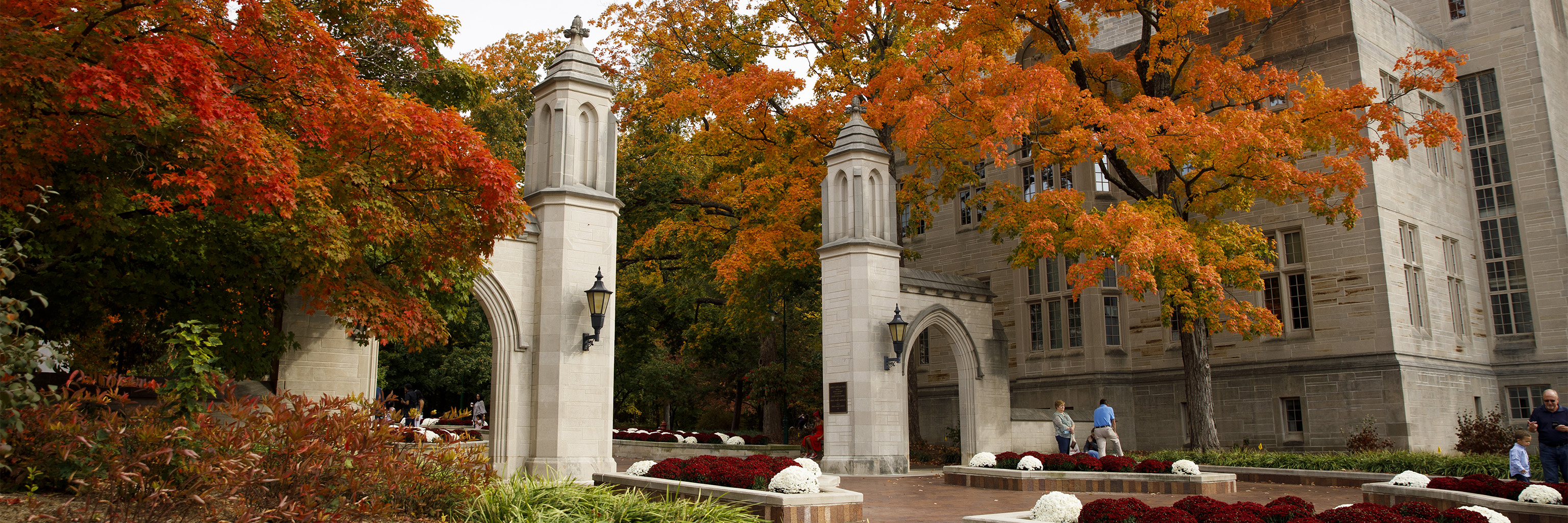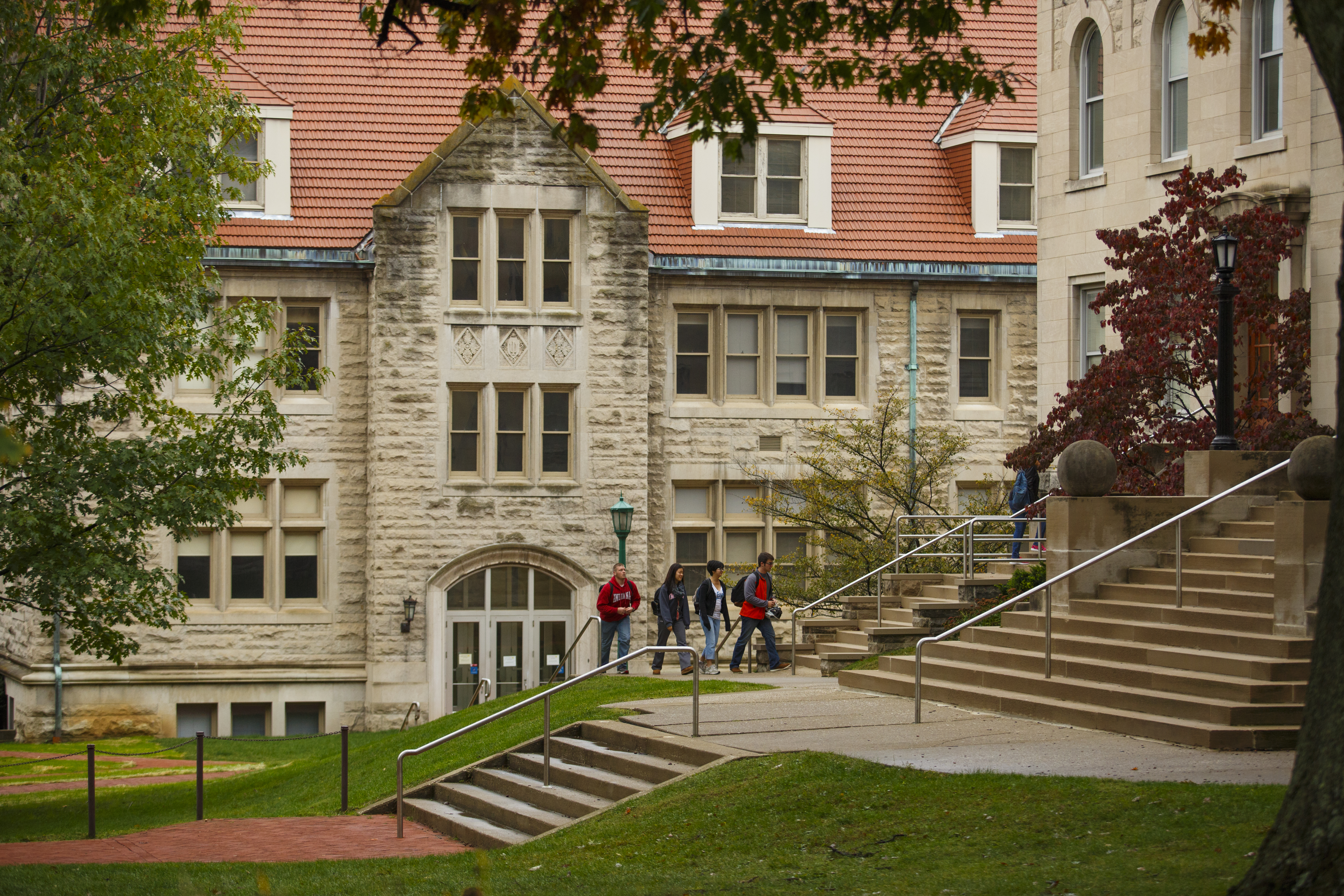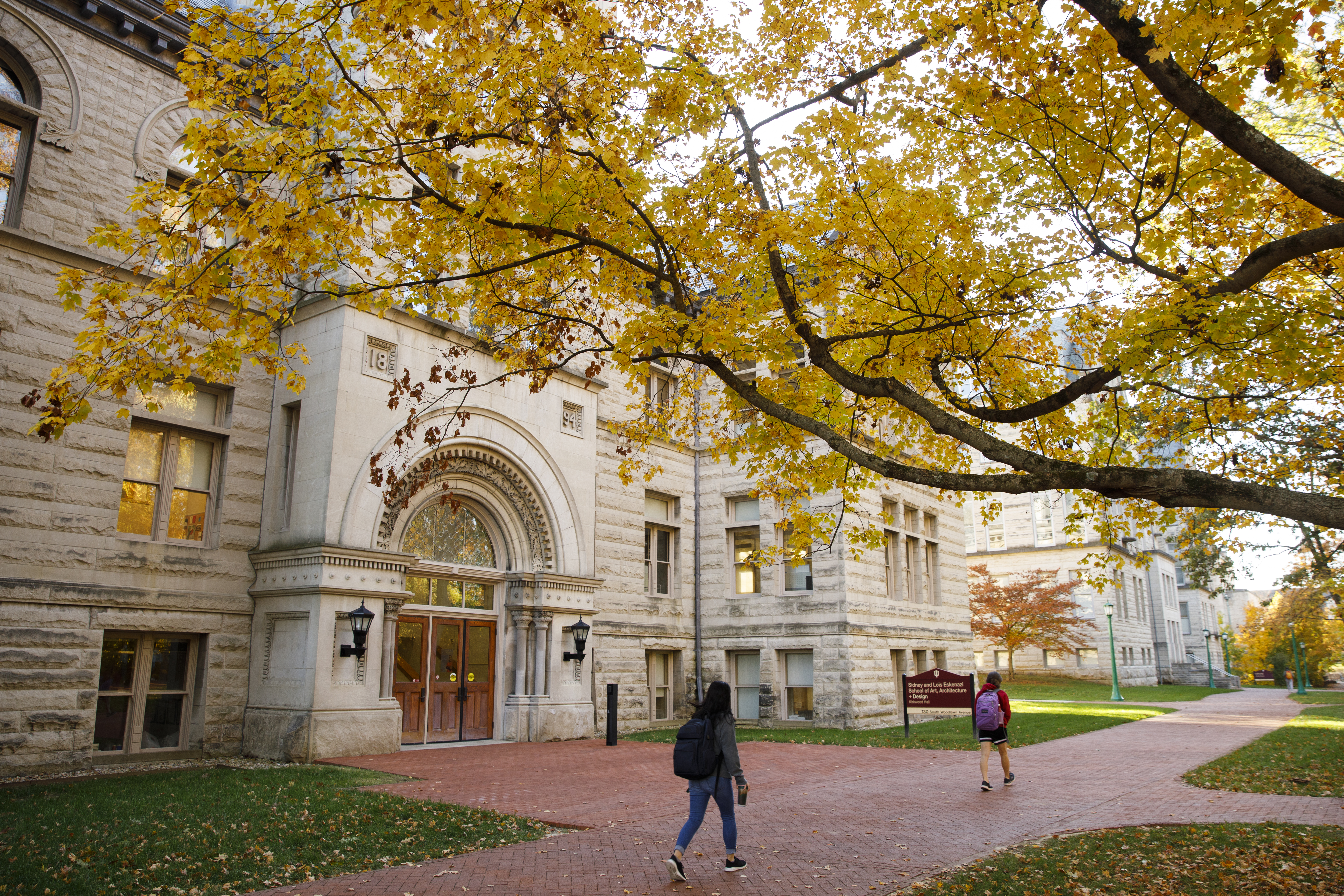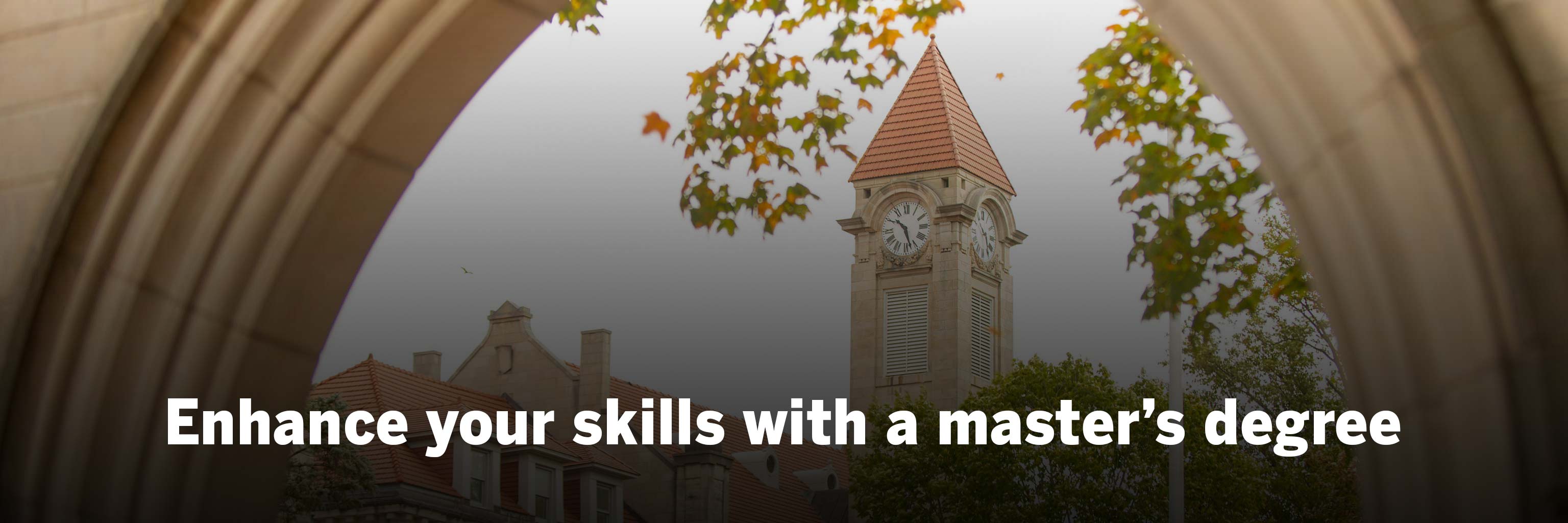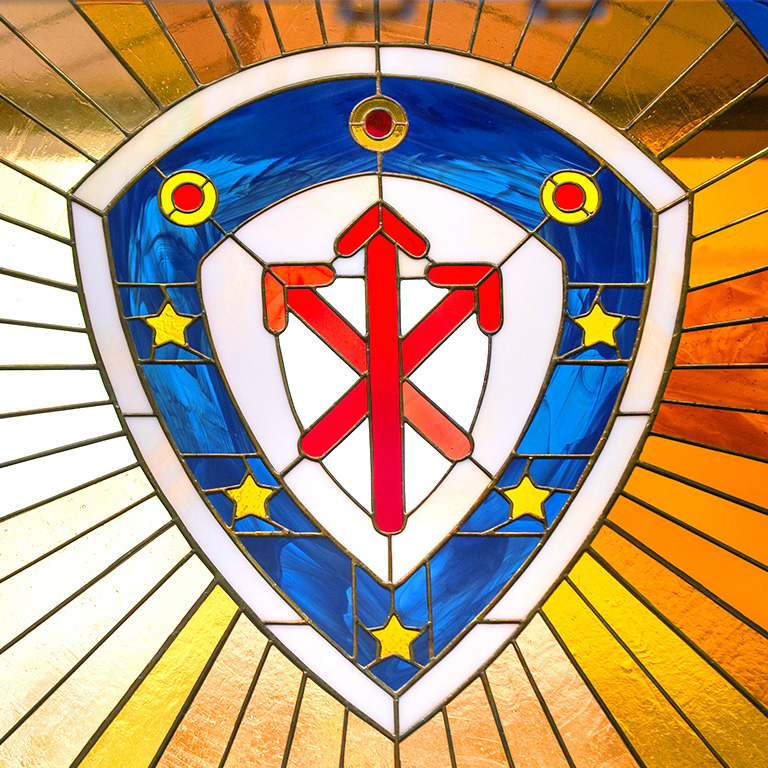
Graduate Degrees

Specialize with an advanced degree in the College
Whether you are sure of your career path or interested in new directions, there may be a master's degree in the College of Arts and Sciences that will help you get where you want to go.
Many students use their master's degree to change direction, adding new skills to their resume or moving toward deeper study of a field that is different from their undergraduate major. Your degree, and the courses you've taken outside your major, could help you make this move.
Check out the degree options below, which highlight some of our pivot-friendly master's programs, to see where graduate study might take you.
- Computational Linguistics M.A. and M.S.
Computational linguistics is an interdisciplinary field which addresses the use of computers to process or produce human language. Linguistics contributes to this field an understanding of the special properties of language data, and also provides theories and descriptions of language structure and use.
Computational linguistics is largely an applied discipline concerned with practical problems. Typical applications include: natural language processing, machine translation (translating from one language to another), speech synthesis, speech production, information retrieval (finding relevant documents or parts of documents in large collections of texts), cognitive modeling, and, in general, almost anything dealing with natural language interfaces.Our programs introduce students to the main concepts in computational linguistics. You will learn how to apply machine learning techniques to problems in computational linguistics. You’ll also learn about the technology underlying products such as Google Translate or Alexa. There is the option to get involved in research for interested students, as well as opportunities for internships with IT companies.
Application requirements
You must complete 120 undergraduate credits before applying to the Computational Linguistics graduate program. You should have taken at least two linguistics courses, a statistics course, and ideally possess some knowledge of programming. Knowledge of a language (or languages) other than English or advanced study of a foreign language may be valuable.
GRE note: The M.A. and M.S. degree programs require the GRE.- Economics M.S.
The Economics M.S. degree combines the very best of learning in Economics: dedicated research-oriented faculty, a strong theoretical grounding, modern computational tools, and advanced econometric methods. It will prepare you for a large variety of careers in the private and public sectors as well as for further graduate training such as Ph.D. programs in Economics or related fields.
Our M.S. in Economics program admits students during the spring, with coursework beginning the following fall term.
Course requirements
A total of 30 credit hours is required for this degree. All of our M.S. students take the same set of three classes in each of the first two semesters. In the third semester, you will choose one of two tracks.The coursework in this program can be finished in three semesters.
Application requirements
You should have an undergraduate major or substantial course work in Economics, Engineering, Mathematics, Statistics or Physics, and may apply to the Department of Economics online. In addition to a completed application, you must include at least three letters of recommendation, official undergraduate transcripts, and scores from the Graduate Record Examination General Test. A total of 30 credit hours is required for this degree. All of our M.S. students take the same set of three classes in each of the first two semesters. In the third semester, you will choose one of two tracks. The coursework in this program can be finished in three semesters.
Our M.S. Degree program is classified as STEM (CIP Code 45.0603: Econometrics and Quantitative Economics). This means that students in this program can apply for a 24-month STEM extension of F-1 Optional Practical Training (OPT).- J. Irwin Miller Architecture M.Arch
The J. Irwin Miller Architecture Program (Miller M.Arch) at Indiana University reimagines the links between art, architecture, and the city by educating architects to be civic minded, innovative, and imaginative world thinkers. The program is housed in the Eskenazi School of Art, Architecture + Design, within the College of Arts and Sciences. The Eskenazi School offers a range of courses at the Bloomington campus and at The Republic Building in Columbus, a city that is nationally known for its outstanding examples of great modern architecture.
The J. Irwin Miller Architecture Program (M.Arch) at Indiana University is designed to educate the architect of the future. Equally well-versed in technology, science, art, and the principles of architecture, our graduates will be the lithe thinkers of tomorrow: able to move smoothly from concept to product. The degree offers a unique studio-based curriculum designed to educate the architect of the future.
The Miller M.Arch degree is a three year plus one summer program of 108 credit hours.
Course requirements
With each project and with each semester, students tackle increasingly complex design problems. They’ll begin with giving priority to the composition of space. In both their third and final semester, students will solve a semester-long design problem with a hands-on research component to address more complex issues of aggregate form in architecture.We see artistic practice as vital to the practice of architecture. That’s why students take parallel studios in architecture and visual arts throughout their three years of study. Though each of these deals with different problems, learning how to tackle measurement, proportion, cadence, relativity, depth, line quality, tonal structure, and visual order in their artwork will greatly enrich the quality and thoughtfulness of their architectural designs for years to come.
Through a series of studios and community engagement projects, students receive a uniquely cumulative education where design problems are interwoven with the concepts of:
• Structure
• Spatial composition and sequence
• Movement
• Admission of light and air
• Energy consumption and sustainability
• Building surface and skin
• Materiality and assembly
• Visual thinking and artistic inquiry
• High degree of experimentationApplication requirements
You should prepare a personal statement, resume/CV, 3 letters of recommendation, and an architectural portfolio. A bachelor’s degree in any discipline from an accredited college or university is also required for admission. There are no course prerequisites, but Calculus I, Physics I, and Arts History courses are recommended.
GRE note: Our program does not require the GRE.- Media M.S.
Expand your knowledge and practical skills in a specialized area of the media industry. The Media M.S. degree is ideal for media practitioners seeking new skills, recent college graduates ready for the next level of training, and non-media professionals looking to make a career change.
We have humanities scholars who take critical, cultural, theoretical, and historical perspectives on film and media. We have social scientists who examine the psychology and sociology of media effects, the processes of communication and the economics of media industries. We have legal experts who study and influence media policy. And we have media professionals—journalists, game designers, filmmakers, scriptwriters and more—people who have made a name for themselves in their industries and who continue to create in our world-class facilities.
No matter which concentration you choose, your coursework will combine hands-on experience in our state-of-the-art facilities with study of the latest theories, techniques and trends related to your chosen field.
Five concentrations
• Data journalism
• Documentary/nonfiction production
• Journalism
• Management
• Strategic communicationApplication requirements
To apply for the Media M.S., you must have a four year bachelor’s degree or international equivalent; at least a B (3.0) average in the major over the last two years of an undergraduate program, or professional equivalency; a statement of purpose; three letters of recommendation; an academic writing sample or creative portfolio; GRE scores from within the past 5 years; and an internet based TOEFL score greater than 100 for international students.- Statistics M.S.
The astonishing amount of data being collected today is transforming science and the skills of statisticians are in demand more than ever. Statistical thinking is a centerpiece of scientific inquiry in many areas of science, raising new questions for researchers interested in applied, methodological, and theoretical questions.
The Statistical Science M.S. degree is intended to prepare a you for a career as a professional statistician working in business, government, or industry. The courses you take will train you to become an applied statistician who collaborates with researchers in various disciplines to design experiments and analyze data.
Course requirements
Master’s students must take STAT-S 692, “Statistical Consulting.” In this course, you will have the opportunity to apply what you learned in class to real statistical and data analysis problems, under the coordination and supervision of the Indiana Statistical Consulting Center. These projects come from researchers across the university and expose students to problems arising in a wide range of fields. You can also choose to take an Internship in Statistical Consulting, in which you will work for a semester in a single real data analysis project, under the supervision of professional statisticians, and interacting with subject-area experts.Application requirements
Coursework needed for admission: a good preparation in calculus is indispensable. Also, linear algebra; not necessarily a whole course, but you need to be comfortable working with matrices. Knowledge of coding is very useful, but not indispensable.GRE note: Our program requires the GRE.
- TESOL and Applied Linguistics M.A.
The TESOL and Applied Linguistics M.A. degree prepares you to work with adult learners of English in a wide range of ESL and EFL settings. The program is rooted in the intimate connection between research and practice in language learning and teaching. It melds linguistic, pedagogical, and contextual dimensions of classroom language learning, and emphasizes informed professionalism in the teacher's work.
The program aims to produce highly competent language teachers who know how language classrooms work and who understand the complex interrelationships among classroom teaching, second language acquisition, curriculum and program design, materials development, assessment, and teacher development. All students will complete a total of 30 credits. Coursework seeks to prepare and professionalize students to teach English to speakers of other languages.
Here, you will have the opportunity to study and work with TESOL leaders and professionals. Our faculty share their teaching innovations and research findings at the annual international TESOL conference, TESOL affiliate meetings, and other professional conferences in such areas as pragmatics, international teaching assistants (ITAs), conventional expressions, second language writing, language teacher education, corrective feedback, and language testing. You will also have the opportunity to gain hands-on teaching experience by teaching ESL in our community outreach program “English in the Evening” (TESOL Practicum), and qualified applicants may also teach in our Intensive English Program and the English Language Improvement Program .
Our graduates have gone on to successful careers teaching in IEPs and other ESL/EFL programs in the US and abroad and include Dudley Reynolds, Past-President of TESOL (MA/PhD) and Ahmar Mahboob, current co-editor of TESOL Quarterly (PhD).Application requirements
Coursework needed for admission includes a strong command of at least one language in addition to English and high proficiency in academic English writing and academic speaking in English (strong performance in most liberal arts should provide this background).GRE note: Our program requires the GRE.
About Indiana University Bloomington
At Indiana University Bloomington, you will find many options, academic experiences, and ways to get involved. You’ll work with renowned faculty, use state-of-the-art equipment in world-class facilities, and have access to all the resources of a Research I university. And, you will be joining a welcoming community of people from around the world—all on one of the most beautiful campuses in the United States.
If you have questions about admissions to IU or life on campus, the Office of International Services (OIS) is here to guide you every step of the way.
